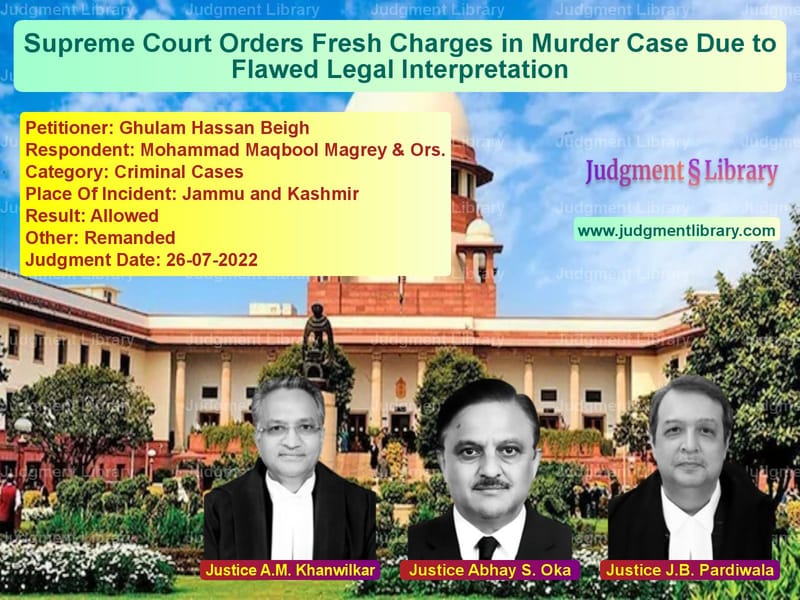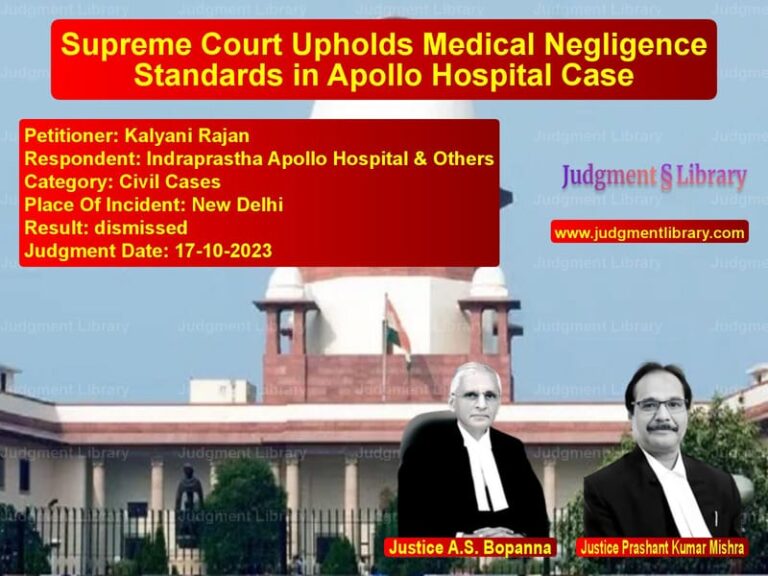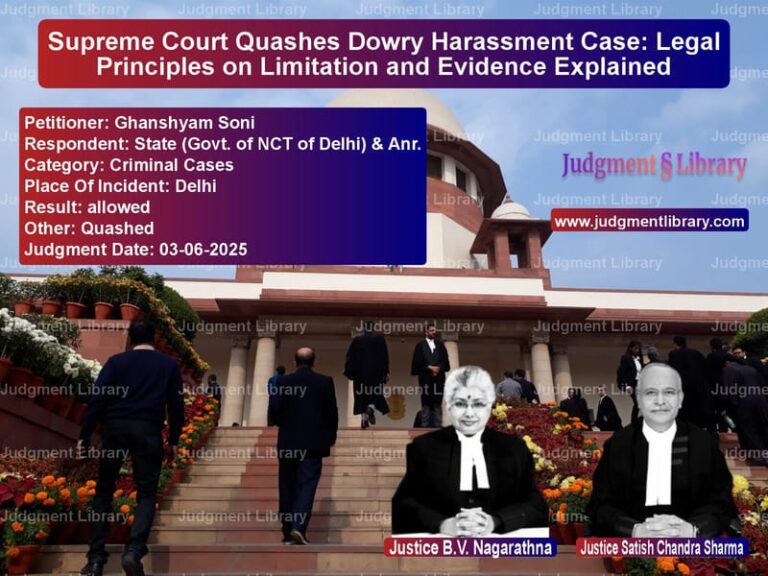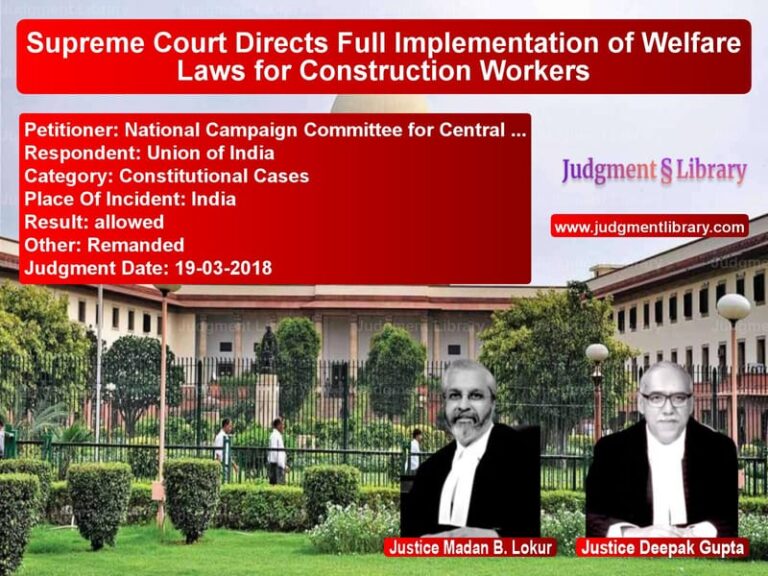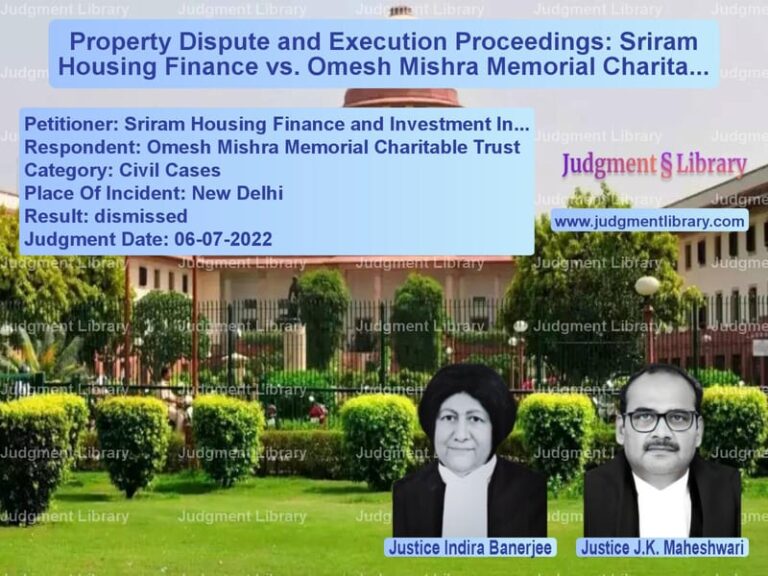Supreme Court Orders Fresh Charges in Murder Case Due to Flawed Legal Interpretation
The Supreme Court of India, in the case of Ghulam Hassan Beigh vs. Mohammad Maqbool Magrey & Ors., set aside the trial court and High Court orders that had downgraded a murder charge under Section 302 IPC to culpable homicide under Section 304 IPC. The Court held that the trial court erred in its approach by conducting a ‘mini-trial’ at the stage of charge framing and relying solely on medical evidence without considering witness testimony. The matter was remanded for fresh consideration.
Background of the Case
The case arose from an incident on March 22, 2020, when the accused allegedly trespassed into the appellant’s property and assaulted him and his family. During the assault, the appellant’s wife, Aisha Begum, sustained injuries and later succumbed to cardio-respiratory failure. Initially, the police registered an FIR under Sections 147, 354, 323, and 451 IPC, which was later amended to include Section 302 IPC after Aisha Begum’s death.
The trial court, however, discharged the accused from murder charges under Section 302 IPC and framed charges under Section 304 IPC, citing the medical report that attributed the death to cardiac arrest without external injuries. The High Court upheld this decision, leading the appellant to approach the Supreme Court.
Key Legal Issues
- Did the trial court err in evaluating medical evidence without considering eyewitness testimony?
- Was the discharge of the accused from Section 302 IPC legally valid?
- Can a trial court conduct a mini-trial while framing charges?
Arguments Presented
Appellant’s (Ghulam Hassan Beigh) Arguments:
- The trial court acted beyond its jurisdiction by making a final assessment of evidence at the charge-framing stage.
- Eyewitness accounts indicated that the accused brutally assaulted the deceased, leading to her death.
- The trial court’s reliance on the medical report alone was erroneous, as the doctor’s court testimony was yet to be recorded.
Respondent’s (Mohammad Maqbool Magrey & Ors.) Arguments:
- The post-mortem report did not conclusively link the injuries to the cause of death.
- The trial court correctly downgraded the charge to culpable homicide under Section 304 IPC based on medical evidence.
- The prosecution failed to establish a direct causal link between the assault and death.
Supreme Court’s Observations and Ruling
The Supreme Court found that the trial court and the High Court erred in their approach. Key observations included:
- At the stage of charge framing, courts must only assess whether there is a prima facie case and should not conduct a mini-trial.
- The post-mortem report is not substantive evidence; the doctor’s oral testimony is necessary to establish medical conclusions.
- The trial court relied exclusively on medical evidence while ignoring eyewitness statements that linked the assault to the death.
- The prosecution must be allowed to prove its case at trial, and premature conclusions at the charge stage undermine due process.
The Supreme Court ruled:
“Whether the cause of death had any nexus with the alleged assault can only be determined based on the testimony of eyewitnesses and the medical expert in court. The post-mortem report alone does not constitute conclusive evidence.”
The Court set aside the trial court and High Court orders and remanded the case for fresh charge consideration under Section 302 IPC.
Key Takeaways from the Judgment
- Courts should not conduct a mini-trial at the charge-framing stage.
- Medical reports alone are insufficient; oral testimony from medical experts is essential.
- Eyewitness accounts must be considered alongside forensic evidence.
- Charges should reflect the prima facie case rather than final guilt determination.
Impact of the Judgment
- Ensures proper legal procedure in charge-framing stages.
- Strengthens judicial oversight in cases where medical evidence is used to downgrade charges.
- Provides guidance on balancing medical and eyewitness evidence in criminal trials.
Conclusion
The Supreme Court’s ruling reinstates the necessity for proper legal analysis at the charge-framing stage. By emphasizing that medical reports must be corroborated by oral testimony and that courts must not conduct mini-trials prematurely, this decision upholds fair trial principles and prevents undue interference with the prosecution’s case. The judgment serves as a crucial precedent in handling criminal cases involving conflicting medical and eyewitness evidence.
Petitioner Name: Ghulam Hassan Beigh.Respondent Name: Mohammad Maqbool Magrey & Ors..Judgment By: Justice A.M. Khanwilkar, Justice Abhay S. Oka, Justice J.B. Pardiwala.Place Of Incident: Jammu and Kashmir.Judgment Date: 26-07-2022.
Don’t miss out on the full details! Download the complete judgment in PDF format below and gain valuable insights instantly!
Download Judgment: ghulam-hassan-beigh-vs-mohammad-maqbool-mag-supreme-court-of-india-judgment-dated-26-07-2022.pdf
Directly Download Judgment: Directly download this Judgment
See all petitions in Murder Cases
See all petitions in Bail and Anticipatory Bail
See all petitions in Judgment by A M Khanwilkar
See all petitions in Judgment by Abhay S. Oka
See all petitions in Judgment by J.B. Pardiwala
See all petitions in allowed
See all petitions in Remanded
See all petitions in supreme court of India judgments July 2022
See all petitions in 2022 judgments
See all posts in Criminal Cases Category
See all allowed petitions in Criminal Cases Category
See all Dismissed petitions in Criminal Cases Category
See all partially allowed petitions in Criminal Cases Category

